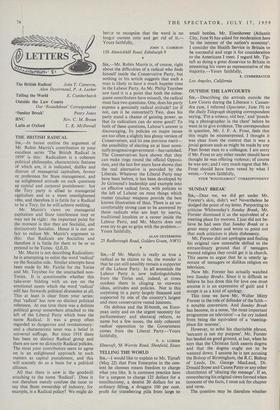SIR,—Mr. Robin Marris is, of course, right about the difficulties
of a radical who finds himself inside the Conservative Party, but nothing in his article suggests that such a man is likely to have a much happier time in the Labour Party. As Mr. Philip Toynbee saw (and it is a point that both the subse- quent contributors have missed), the radical must face two questions. One, does his party express a genuinely radical attitude? (or if not, can it be converted?) Two, does his party stand a chance of gaining power, so that its radicalism can do some good? To both of these questions, Labour's answer is discouraging. Its policies on major issues are too often a slightly less glossy version of Conservatism, and its one previous merit— the possibility of electing an at least nomi- nally progressive government—has vanished. The Conservatives have shown that they can make rings round the official Opposi- tion, and the last few years have shown that the real alternative is provided by the Liberals. Whatever the Liberal Party may have been before, it has been developed by
Jo Grimond's leadership and example into an effective radical force, with policies to the left of Labour on most things which matter (nuclear weapons provide the best known illustration of this). There is an un- comfortably strong case to be answered by those radicals who are kept by inertia, traditional loyalties or a career inside the Labour Party, and Mr. Marris does not even try to get to grips with the problem.— Yours faithfully,
ALAN DEYERMOND 25 Rodborough Road, Golders Green, NW11






































 Previous page
Previous page